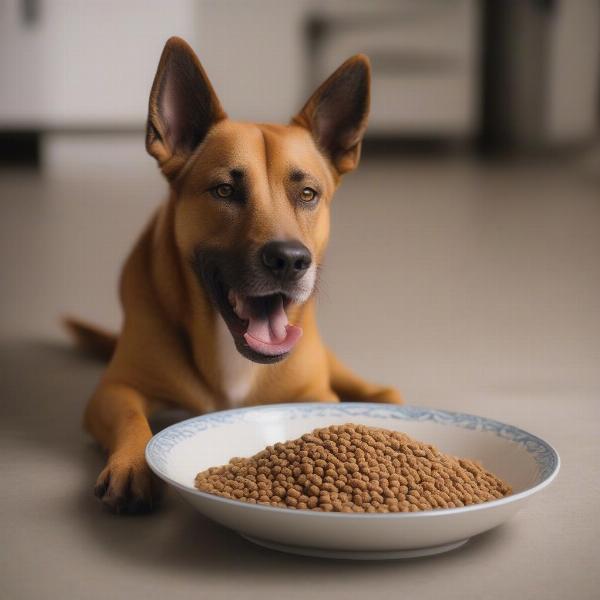If your dog is constantly swallowing, it can be a worrying sign. While occasional swallowing is normal, frequent or excessive swallowing in dogs can indicate a range of issues, from minor discomfort to more serious medical conditions. This article will explore the potential causes of frequent swallowing in dogs, when to seek veterinary help, and how to ensure your canine companion stays healthy and comfortable.
Understanding Why Your Dog Might Be Swallowing Excessively
There are several reasons why your dog might be exhibiting excessive swallowing. Some of the most common include nausea, dehydration, oral discomfort, gastrointestinal issues, or even a foreign body lodged in their throat. Identifying the underlying cause is crucial for effective treatment.
Nausea and Upset Stomach
Just like humans, dogs experience nausea, which can lead to increased salivation and swallowing. This could be due to something as simple as eating something disagreeable or a more serious condition like gastroenteritis. If your dog is constantly swallowing and also exhibiting other signs like vomiting, diarrhea, or loss of appetite, it’s important to consult a vet.
Dehydration
A dehydrated dog will often swallow excessively due to dry mouth. Ensuring your dog has access to fresh, clean water at all times is essential, especially during hot weather or after strenuous exercise.
Oral Discomfort or Pain
Pain or discomfort in the mouth, such as dental disease, gum inflammation, or oral injuries, can also cause a dog to swallow more frequently. Regular dental checkups and cleaning are crucial for maintaining your dog’s oral health. Look for signs like bad breath, red or swollen gums, or difficulty eating.
Foreign Objects
Sometimes, a dog might swallow a foreign object, such as a piece of toy, bone splinter, or even a stick, which can get lodged in their throat or esophagus. This can cause discomfort and lead to excessive swallowing, drooling, gagging, or vomiting. If you suspect your dog has swallowed a foreign object, seek immediate veterinary attention.
Gastrointestinal Issues
Certain gastrointestinal conditions, such as acid reflux or esophageal disorders, can also trigger frequent swallowing. These conditions can cause discomfort and inflammation, leading to increased swallowing in an attempt to alleviate the irritation.
When to Seek Veterinary Attention
While some causes of excessive swallowing are relatively minor, others can be serious. It’s crucial to seek veterinary attention if your dog’s swallowing is accompanied by other symptoms, including:
- Vomiting
- Diarrhea
- Loss of appetite
- Lethargy
- Drooling
- Gagging
- Difficulty breathing
- Changes in behavior
“Early intervention is key when it comes to treating many canine health issues,” says Dr. Emily Carter, DVM, a leading veterinary specialist in canine gastroenterology. “If you notice your dog swallowing excessively, especially alongside other symptoms, don’t hesitate to contact your veterinarian.”
Managing Your Dog’s Swallowing Issues
The treatment for excessive swallowing depends entirely on the underlying cause. Your veterinarian will perform a thorough examination and may recommend further diagnostic tests, such as blood work, X-rays, or endoscopy, to determine the cause.
 Dog Eating Healthy Food
Dog Eating Healthy Food
Once the cause is identified, your veterinarian will recommend an appropriate treatment plan. This may involve medication, dietary changes, surgery to remove a foreign object, or dental procedures to address oral health issues.
Conclusion
Excessive swallowing in dogs can be a sign of various underlying conditions. It’s important to observe your dog closely and seek veterinary attention if you notice any unusual swallowing patterns or accompanying symptoms. Early diagnosis and treatment are crucial for ensuring your dog’s well-being and preventing more serious complications. By paying attention to your dog’s behavior and seeking professional guidance when needed, you can help your furry friend live a long, healthy, and comfortable life.
FAQ
- Why is my dog constantly licking and swallowing? Licking and swallowing can be related to nausea, anxiety, or oral discomfort.
- What does it mean when a dog keeps gulping? Gulping or excessive swallowing can indicate several health issues, including dehydration, nausea, or a throat obstruction.
- Should I be worried if my dog is swallowing a lot of air? Swallowing a lot of air, or aerophagia, can lead to bloating and discomfort. Consult your veterinarian.
- Can anxiety cause excessive swallowing in dogs? Yes, anxiety can lead to increased salivation and swallowing.
- How can I tell if my dog has something stuck in its throat? Signs include gagging, coughing, excessive swallowing, drooling, and difficulty breathing. Seek immediate veterinary help.
- Is excessive swallowing in older dogs normal? While some age-related changes might occur, excessive swallowing in older dogs should still be investigated by a veterinarian.
- What home remedies can I try for my dog’s excessive swallowing? It’s crucial to consult your veterinarian before attempting any home remedies. Treating the underlying cause is essential.
Related Articles:
About ILM Dog:
ILM Dog is your trusted source for comprehensive information on dog care and well-being. From breed selection and health advice to training tips and product recommendations, we’re dedicated to empowering dog owners worldwide. Our team of experts provides insightful articles, practical guides, and up-to-date information to help you navigate every aspect of dog ownership. We offer a wide range of resources covering dog health, nutrition, training, grooming, and much more. For any inquiries or to learn more about our services, contact us at [email protected] or call us at +44 20-3965-8624. Visit ILM Dog for all your dog care needs.